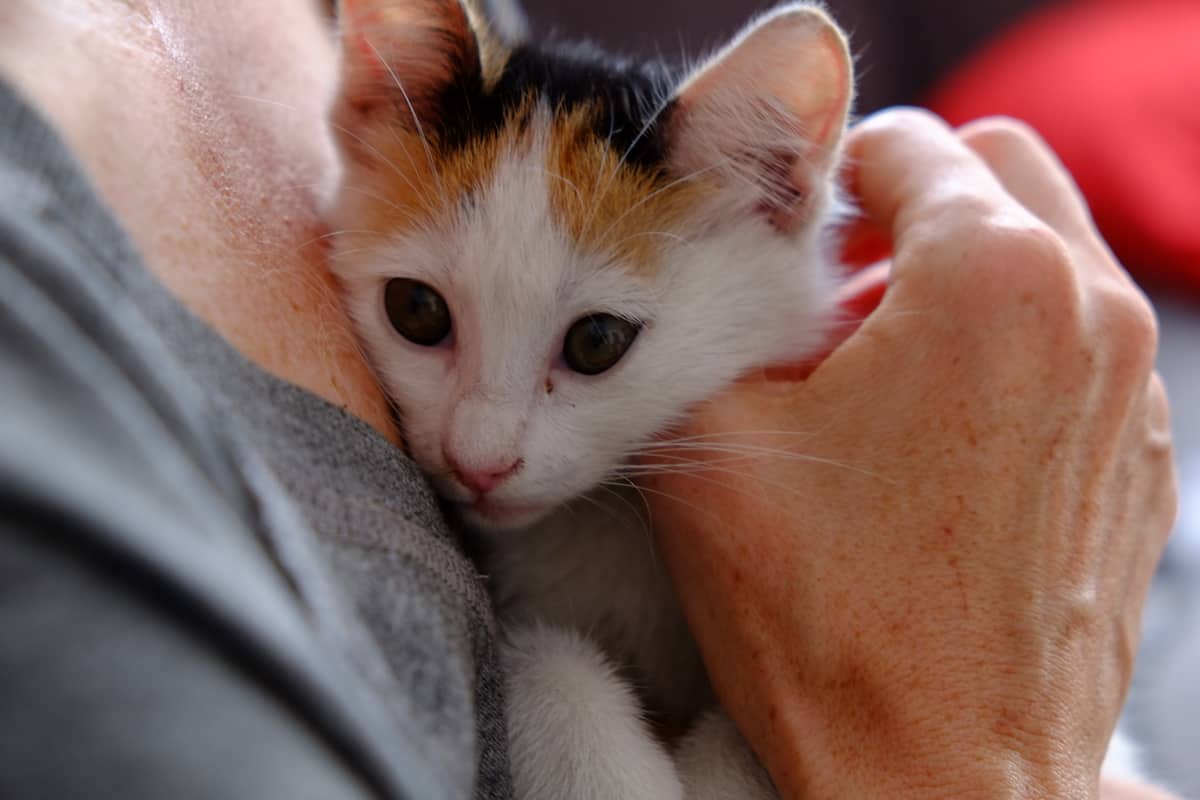As an animal lover, one of my favorite aspects of life in Turkey can also be one of the most challenging: seeing cats and dogs live on the streets. On one hand, I love how people and animals here live together on what often feels like equal terms. I love seeing a cat or dog run the show in a café. And the warmth and care (and kibble) I see provided to the four-legged denizens of most neighborhoods reaffirms my faith in humanity daily.
Of course, it’s not all outdoor food bowls and gentle pats, however. While most street animals here look downright pampered compared to their counterparts in poorer countries, anyone who’s lived here a while has seen street animals with badly healed broken legs, untreated tumors or oozing infections. Or just plain hungry and cold, especially now that the temperatures are dropping.

What’s an animal lover to do? Soon after I arrived I started taking cat food to the park and kept a dish filled on our sidewalk. Then, in late September, a white kitten chose my girlfriend and me as its new adoptive parents. We didn’t have much say in the matter, really. Not wanting him to grow up as an only-cat, I picked up an even tinier kitten in the park two days later. The experience with these two has been unlike any I’ve had with cats from a shelter back in the States or Western Europe. It’s definitely been a lot more difficult. It’s also been more rewarding. And if I’d known what to expect I would’ve adopted a Turkish street animal a lot sooner. Here, then, some pointers for you, fellow animal-loving yabancı:
Likely Diseases
You can pretty much bet on street animals being riddled with parasites. Older animals may have found a way to coexist with them, but youngsters will be overwhelmed. Our kittens sure were: one was crawling with fleas, the other had terrible diarrhea from internal parasites.
And that’s par for the course, said our veterinarian, Yasemin Toptan, who owns the Mayavet clinic in Alsancak İzmir, where she treats (and adopts out) a lot of street animals. “Diarrhea is very common in them,” she said. The cause could be parasites, bacteria, viruses or just bad food scrounged from the garbage, she said.

Testing the blood or stool would give certainty about the cause, but those tests are not cheap (about 500 TL). So, since parasites are the most-common cause and since our cats had no symptoms pointing toward other diseases, Yasemin hanım chose to treat for parasites. The shots and oral worm medication cleared things up in a week. She recommended a special diet while the kittens were recovering (see ‘Food’ section).
The external parasites, aka fleas, were dispatched with flea medicine applied to on the back of the kittens’ heads. I was wary of using what essentially is a pesticide on animals so young, but Yasemin said it’s the only way of dealing with a full-blown infestation and that baths were useless in this case. She was right: Before I took our kittens to her office, I had tried every trick I found online and had bathed the younger kitten twice in one morning, but the fleas were not impressed.
A lot of street animals have eye infections, Yasemin said. If their eyes look inflamed and/or there’s discharge from their eyes, a good first-aid measure is to clean their eyes with cotton pads dipped in warm (not hot!) black tea, she said. Many also may have external injuries from fights. Small wounds can be cleaned with warm water (no soap!). Then apply Batikon, an antiseptic commonly available at pharmacies.
If you find a cat with a broken leg, gently put it in the smallest crate or box possible to restrict its movement, then take it to the vet immediately. Lone kittens, without the benefit of their families’ body warmth, are at serious risk of dying from exposure in the cooler months. If you find one that’s shaking, a hot-water bottle wrapped in a towel can save a kitten’s life, Yasemin said.
Vomiting can be a sign of a serious health problem in cats. Throwing up once or twice usually means nothing, but if a cat vomits more often than that, seems sleepy and has low body temperature (a healthy cat’s ears and foot pads feel warm to the touch), it might be facing an emergency. A cat with those symptoms should be taken to a vet right away, day or night, Yasemin said. There’s no home remedy for vomiting.
What to Feed
First of all, don’t give a cat milk. Ever. It gives them diarrhea, which in the case of cats with already compromised immune systems, e.g., street cats, could lead to more problems. You can help a cat with diarrhea by feeding it a mix of boiled chicken breast, rice and yoghurt. I’d never cooked for a cat before— one of many firsts with our Turkish street cats.

Make sure you get age-appropriate food. Kittens can’t chew the hard, adult kibble yet, and need more vitamins and other nutrients to grow up healthy. Any decent pet food will specify the age group for which it’s intended. For cats under one year, our vet recommended buying only the highest-quality food. It’s a worthy investment, she said. The young cats will end up healthier for the rest of their lives if they get the proper nutrition while their bodies are growing, she said. If it gets too expensive, switch to cheaper food after the cat’s first birthday.
Socializing & Training
Here’s the good news: most street cats take to the litter box like fish to water. Ours sure did. They’re already used to finding a patch of dirt to bury their business. We’ve had zero accidents so far. Just set them in the box as soon as they arrive at your house, and they’ll remember where it is.
If you’re getting more than one cat, or if you already have another pet in the house, keep the animals separated under all circumstances until all of them are healthy (and a vet has told you they are). For cats, this also helps their getting used to living with another cat. Whole books have been written on getting cats socialized with each other, but my basic tip is to limit their time together at first and to keep your calm. If you’re freaking out, they will too.
When you take in an older cat, don’t expect them to happily live with you right away, even if they were friendly on the street. They have to learn to trust humans. Be prepared that they might never turn into cuddly lap-cats. I highly recommend adopting more than one cat, especially if you’re getting kittens. You can never personally match the amount of exercise and mental stimulation they will give each other. And they’re so much fun to watch.
Dogs
I’ve kept this mostly about cats because, to my surprise, our vet recommended against adopting large, adult street dogs. She said they are too used to being outside, to being free. They would not be happy in an apartment. There probably are exceptions to this rule, but that’s what the expert said. She also said, however, that smaller breeds or puppies would be perfectly happy to come live with you. (I just never see any of those on our streets).

Dogs often suffer from similar parasite infestations as cats (worms, fleas, etc.) and their treatment is quite similar. But (street) dogs are at risk for two very serious diseases: parvo virus and distemper. Severe vomiting is a symptom for both. Dogs with parvo have watery diarrhea, possibly with blood in it. Distemper often causes very runny noses in dogs.
Either disease is much too serious to try to diagnose at home. If the dog shows signs of pain, disproportionate fearfulness, seems weak, and shows any other physical abnormality, take it to the vet immediately. If these diseases are caught within a couple days after symptoms arise, the dog has a chance of survival. Otherwise, it might not.
Traveling with Your Adopted Pet
You’ve adopted a street animal, they’re happy and healthy, and now you want to move back to your home country. Do NOT wait until the last minute to get your animal’s paperwork. In fact, if you’re going to Europe, start the process at least three months before you intend to travel. The process is identical for cats and dogs. The animal needs to be examined, vaccinated and microchipped by your vet, who then issues a vaccination booklet and a health certificate.
Then it gets more complicated depending on where you go. If you’re moving your pet to the European Union or to Australia, for example, you need a certified rabies titer test from a lab approved by your government. Your vet and your consulate can help with the process. The certificate is good for one year. The test must be performed at least one month after a rabies vaccination, but no less than three months before you travel. If you’re going to the United States or Canada you can skip that last step. Many countries (and most airlines) accept the report from your vet as proof that your pet is vaccinated and healthy.

Unfortunately, things get a little murky when it comes to legally leaving Turkey. The official word is that you need to obtain a permit from your local Veteriner Sınır Kontrol Noktası (veterinary border control) to leave Turkey with an animal. The agency will want to see your passport, travel booking, the vet-issued documents mentioned above, and the animal itself. Then they issue a permit for the exact date of your travel. However, it is unclear whether this permit is absolutely required in practice. I personally know someone who’s flown to Canada and back with his cat with just the vaccination booklet. Of course, it would be terrible if your cat or dog wasn’t allowed on the plane.
The steps outlined above are the complete process; calls to your consulate and talking to your vet will help you decide whether to follow all steps.
Glossary of Terms You Might Need at the Vet
Muayene – Exam
Aşı – Vaccination
Parazit – Parasite
Pire – Flea
Kene – Tick
Hastalık – Illness
İshal – Diarrhea
Kusma – Vomiting
Öksürmek – Coughing
Vücut ısısı – Body temperature
Sümük – Mucus, Snot
Kuru mama – Dry food
Yaş mama / Konserve – Wet food












Great article, Jacques!
I’m in accord with your (surprisingly knowledgeable) vet on almost everything you wrote about both cats and dogs, both health and behaviour wise.
Where we part company, is with the advice you give for travelling with pets… for the EU it’s a FOUR month process, for certain countries like the UK you can’t fly with your pets, and you certainly can’t take your pet to Australia from here.The titre certificate is good for LIFE as long as the pet has a rabies booster annually, it is ONLY issued here from one lab in Ankara through your vet, there is no limitation on travel. The certificate of good health is in your pet’s vet booklet and should be signed and stamped by your vet five days or less prior to travel. Most vets here have little if no idea of the steps required and your consulate would never be involved with any part of this procedure.
If you have been issued with a ‘Pet Passport’ in Turkey, it isn’t, and is not considered valid. It’s a vet booklet and that’s all, and doesn’t qualify your pet to travel in the EU without a titre certificate.
As for the third party certificate for departure from Turkey, you are correct in thinking its rarely if ever asked for when you depart by air however, the ministry you need to contact is T.C. GIDA TARIM VE HAYVANCILIK BAKANLIĞI and with the exception of just one office, they do not want you to take your pet with you.
Should you or anyone reading this article want to be spared the heartache of the consequences of following inaccurate information on such an important subject, please join our rescue group https://www.facebook.com/groups/cihangircoolforcats where we have all the relevant information in our files and you may ask for and receive speedy advice on any subject to do with cats, dogs and smaller animals.
Hello Hilary, thank you for that input, but I have to disagree with you. You can fly to the UK with your pet if you follow the correct steps. The same is true for Australia, except that the steps for that country are very, very complex. This is based on information from those country’s government websites. Of course, I couldn’t detail the steps for each country, which is why I suggested to readers to have their consulate point them toward the information for their country. They wouldn’t get directly involved, but they can tell people where to find specific information for their country. The process for the EU does indeed take four months, if you count the one month you need to wait after the vaccination. But since everyone should have their pet vaccinated already, the process after that takes a little over three months.
you absolutely cannot fly to the UK with your pet. they must go as manifest cargo and you must use a very expensive agent (£1,000+)
nor can you fly to Australia with your pet (similar rules apply) and if the pet travelled from here, it would have to be quarantined there at your own expense.
the consulates do not offer much in the way of information for pet transportation, and in certain instances have been incorrect in the information they have offered.
IF your pet is microchipped before its last rabies shot, you can cut the time to EU down to three months (from date of blood taken) however most animals here are NOT microchipped.
What Hilary writes about the UK is correct. I went to UK and came back a year later with 4 cats which had a cost of near £4,000 (no typos there). I used a Turkish export agent which was the cheapest I could find. For the return trip you need to have a fit to travel certificate which was around £150/cat which took all of 15 minutes for the 4 cats. I must note that I don’t have EU passport. For those with EU passport it might be possible to fly with your pets but in-cabin flight has (if I remember correctly) 1 pet per person limit.
[…] adopt an animals but don’t have any experience, there are also some website like this one: http://yabangee.com/guide-adopting-street-animals-turkey/ But this website gives guidance for people in Turkey, but you can use it for other places too, in […]
Well there are not much to say cause you wrote an amazing article already! Your vet is obviously a good one because not all of them are unfortunely. I am from turkey and can say that all the information are true. Its pretty sad there are many street animals on the country. Btw just wanna add this; i have adopted 2 cats and a puppy from streets and DON’T ADOPT A PUPPY FROM A SHELTER in turkey unless if you search them very well. Most of the shelters are full of diseases. Most puppies are dying because of bloody diarrhea. Its terrible that these places are worse than streets. And if you don’t have water or food when you see a stray animal please at least pet them. Most of them are really need love.
Hi,
I have been reading these threads.
I would like to adopt two cats from Turkey.
Please if anyone has any step by step advice/prices/procedures, please share them with me it’d be greatly appreciated
Hi Faye,
I don’ t know if you ‘ve already adopted cats from Turkey, but if not I can help you with my rescued cats. Just get in touch with me if your search for adoption is continueing.
Hello, we are living in Istanbul. Together with my husband, we are trying to save as much as stray cats and dogs, even birds with health issues from streets, take them to vet, cure them withour any support from anywhere and then the main problem starts for us when we try to find forever homes for these rescued animals. If there is anybody interested in adopting cats and dogs (mostly cats) please contact us. Then together we can have a chance to save lifes of these lovely animals by finding safe homes for them.
@ Nil Kara, do you have an email to contact you at for adoption of cats?
Where can I contact you please?
Hi, we are living in Alanya where we are taking care of more than 60 foster cats in our rescue center from Arga. And we have volunteers who are feeding at 25 places in alanya. The biggest problem is to get the cats adopted to their furrever homes especially after all prices are dramatically increased. If your interested just send an email to arga.alanya@gmail.com